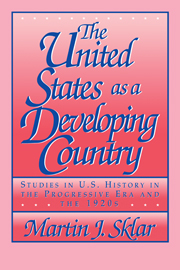 The United States as a Developing Country
The United States as a Developing Country Book contents
- Frontmatter
- Contents
- Preface
- I Periodization and historiography: The United States considered as a developing country
- II Studying American political development in the Progressive Era, 1890S–1916
- III Dollar Diplomacy according to Dollar Diplomats: American development and world development
- IV Woodrow Wilson and the developmental imperatives of modern U.S. liberalism
- V Some political and cultural consequences of the disaccumulation of capital: Origins of postindustrial development in the 1920s
- VI Disaffected with development: Henry Adams and the 1960s “New Left”
- VII The corporate reconstruction of American capitalism: A note on the capitalism–socialism mix in U.S. and world development
- Index
VI - Disaffected with development: Henry Adams and the 1960s “New Left”
Published online by Cambridge University Press: 03 February 2010
- Frontmatter
- Contents
- Preface
- I Periodization and historiography: The United States considered as a developing country
- II Studying American political development in the Progressive Era, 1890S–1916
- III Dollar Diplomacy according to Dollar Diplomats: American development and world development
- IV Woodrow Wilson and the developmental imperatives of modern U.S. liberalism
- V Some political and cultural consequences of the disaccumulation of capital: Origins of postindustrial development in the 1920s
- VI Disaffected with development: Henry Adams and the 1960s “New Left”
- VII The corporate reconstruction of American capitalism: A note on the capitalism–socialism mix in U.S. and world development
- Index
Summary
Strange times
We live in strange times: peasants rally to proletarian standards; proletarians vote for liberal slogans; liberals glorify authoritarian nationalism; communists are evolutionary reformists; constitutional republicans are expropriating revolutionaries; conservative aristocrats are patrons of social revolution; multilateral internationalists are the worldwide bastions of parochial reaction and counterrevolution; orthodox Marxists are sober analysts of on-the-one-hand-on-the-other; ultra-rightists are Jeffersonian Democrats; urbane “Marxist-Leninists” are men-of-thedeed Bakuninists; big business men are welfare-state humanitarians; American-Firsters are NATO-enthusiasts; racial equalitarians are political separatists; existentialists are Marxists; new Bolsheviks are old Mensheviks; free-marketeers are revolutionary anti-imperialists; New Leftists are old instrumentalists; “Stalinists” are “Trotskyists” and viceversa; Protestant theologians are catholic atheists; impious libertines are reverential believers; direct-actionists are transcendental idealists; Christian gentlemen are economic determinists; partisan assembling socialists are careful scholars; careful scholars are dissembling political partisans. Everyone calls himself by one name, bespeaks another, and acts a third. No one looks in the mirror without seeing an unfamiliar face. Everyone has learned to expect the unexpected. Only surprises no longer surprise. Time-honored words and phrases, leaders and movements, parties and nations, seem to assume incredible juxtapositions. Whatever its career in the world of art (which tends to anticipate life by a few decades or more in any case), surrealism appears to have invaded the world of intellect and politics.
- Type
- Chapter
- Information
- The United States as a Developing CountryStudies in U.S. History in the Progressive Era and the 1920s, pp. 197 - 208Publisher: Cambridge University PressPrint publication year: 1992


